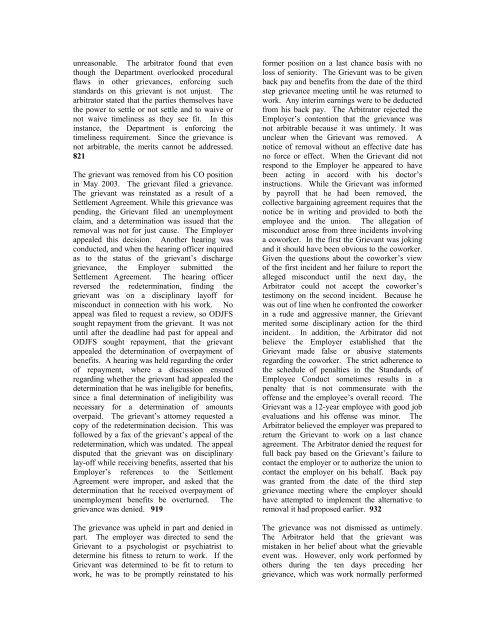by Contract Number (PDF) - OCSEA
by Contract Number (PDF) - OCSEA
by Contract Number (PDF) - OCSEA
You also want an ePaper? Increase the reach of your titles
YUMPU automatically turns print PDFs into web optimized ePapers that Google loves.
unreasonable. The arbitrator found that even<br />
though the Department overlooked procedural<br />
flaws in other grievances, enforcing such<br />
standards on this grievant is not unjust. The<br />
arbitrator stated that the parties themselves have<br />
the power to settle or not settle and to waive or<br />
not waive timeliness as they see fit. In this<br />
instance, the Department is enforcing the<br />
timeliness requirement. Since the grievance is<br />
not arbitrable, the merits cannot be addressed.<br />
821<br />
The grievant was removed from his CO position<br />
in May 2003. The grievant filed a grievance.<br />
The grievant was reinstated as a result of a<br />
Settlement Agreement. While this grievance was<br />
pending, the Grievant filed an unemployment<br />
claim, and a determination was issued that the<br />
removal was not for just cause. The Employer<br />
appealed this decision. Another hearing was<br />
conducted, and when the hearing officer inquired<br />
as to the status of the grievant’s discharge<br />
grievance, the Employer submitted the<br />
Settlement Agreement. The hearing officer<br />
reversed the redetermination, finding the<br />
grievant was on a disciplinary layoff for<br />
misconduct in connection with his work. No<br />
appeal was filed to request a review, so ODJFS<br />
sought repayment from the grievant. It was not<br />
until after the deadline had past for appeal and<br />
ODJFS sought repayment, that the grievant<br />
appealed the determination of overpayment of<br />
benefits. A hearing was held regarding the order<br />
of repayment, where a discussion ensued<br />
regarding whether the grievant had appealed the<br />
determination that he was ineligible for benefits,<br />
since a final determination of ineligibility was<br />
necessary for a determination of amounts<br />
overpaid. The grievant’s attorney requested a<br />
copy of the redetermination decision. This was<br />
followed <strong>by</strong> a fax of the grievant’s appeal of the<br />
redetermination, which was undated. The appeal<br />
disputed that the grievant was on disciplinary<br />
lay-off while receiving benefits, asserted that his<br />
Employer’s references to the Settlement<br />
Agreement were improper, and asked that the<br />
determination that he received overpayment of<br />
unemployment benefits be overturned. The<br />
grievance was denied. 919<br />
The grievance was upheld in part and denied in<br />
part. The employer was directed to send the<br />
Grievant to a psychologist or psychiatrist to<br />
determine his fitness to return to work. If the<br />
Grievant was determined to be fit to return to<br />
work, he was to be promptly reinstated to his<br />
former position on a last chance basis with no<br />
loss of seniority. The Grievant was to be given<br />
back pay and benefits from the date of the third<br />
step grievance meeting until he was returned to<br />
work. Any interim earnings were to be deducted<br />
from his back pay. The Arbitrator rejected the<br />
Employer’s contention that the grievance was<br />
not arbitrable because it was untimely. It was<br />
unclear when the Grievant was removed. A<br />
notice of removal without an effective date has<br />
no force or effect. When the Grievant did not<br />
respond to the Employer he appeared to have<br />
been acting in accord with his doctor’s<br />
instructions. While the Grievant was informed<br />
<strong>by</strong> payroll that he had been removed, the<br />
collective bargaining agreement requires that the<br />
notice be in writing and provided to both the<br />
employee and the union. The allegation of<br />
misconduct arose from three incidents involving<br />
a coworker. In the first the Grievant was joking<br />
and it should have been obvious to the coworker.<br />
Given the questions about the coworker’s view<br />
of the first incident and her failure to report the<br />
alleged misconduct until the next day, the<br />
Arbitrator could not accept the coworker’s<br />
testimony on the second incident. Because he<br />
was out of line when he confronted the coworker<br />
in a rude and aggressive manner, the Grievant<br />
merited some disciplinary action for the third<br />
incident. In addition, the Arbitrator did not<br />
believe the Employer established that the<br />
Grievant made false or abusive statements<br />
regarding the coworker. The strict adherence to<br />
the schedule of penalties in the Standards of<br />
Employee Conduct sometimes results in a<br />
penalty that is not commensurate with the<br />
offense and the employee’s overall record. The<br />
Grievant was a 12-year employee with good job<br />
evaluations and his offense was minor. The<br />
Arbitrator believed the employer was prepared to<br />
return the Grievant to work on a last chance<br />
agreement. The Arbitrator denied the request for<br />
full back pay based on the Grievant’s failure to<br />
contact the employer or to authorize the union to<br />
contact the employer on his behalf. Back pay<br />
was granted from the date of the third step<br />
grievance meeting where the employer should<br />
have attempted to implement the alternative to<br />
removal it had proposed earlier. 932<br />
The grievance was not dismissed as untimely.<br />
The Arbitrator held that the grievant was<br />
mistaken in her belief about what the grievable<br />
event was. However, only work performed <strong>by</strong><br />
others during the ten days preceding her<br />
grievance, which was work normally performed
















